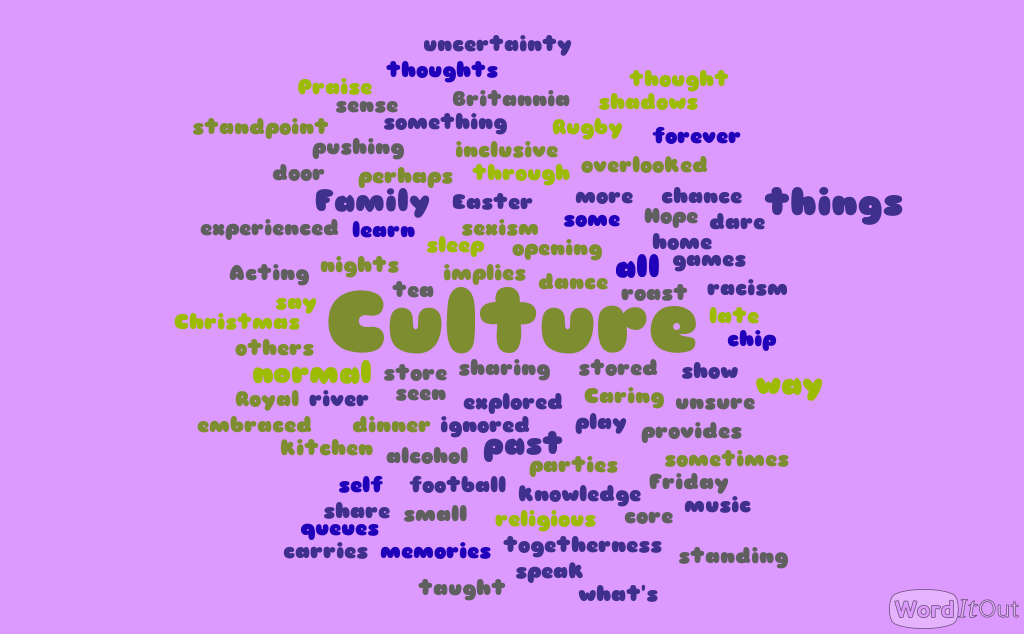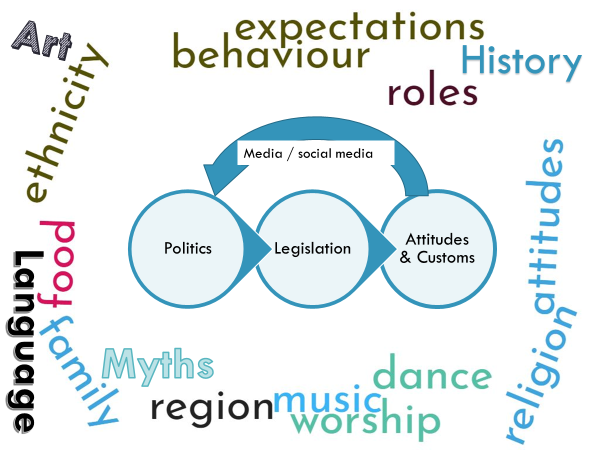How does our culture influence our practice?
How does our culture influence our beliefs, attitudes and practices? It is wrong to make assumptions about people's preferences based on generalisations, but at the same time it is good to be aware of cultural factors that might influence their participation or your intervention.

Session idea
Elizabeth Taylor, Professional Lead/Head of Section for Occupational Therapy within the Centre for Allied Health explores cultural contexts by inviting students to present to each other in small groups to hear about each other's cultures. This includes the following prompts:
- Tell me about your culture
- Are there any cultural beliefs or practices you would want health professionals to understand and respect?
- What are your beliefs about health and recovery?
- Attitudes about family support / roles / responsibilities?
This is always a stimulating session, and students often challenge our assumptions and surprise us when sharing their cultural heritage. We have representation from a diverse range of cultural and ethnic backgrounds, and we learn a lot from hearing about some students’ experiences of growing up with a variety of cultural influences.
Poem by Kara Lee
By way of response to these prompts, Kara Lee, Occupational Therapy Student composed a poem:
CULTURE
What is “culture”?
Is the Royal Family? Praise Britannia?
Is it football? Rugby?
Is it standing in queues, or pushing your way through?
Is it racism, sexism, and others I dare not speak?
Is it alcohol, late nights, no sleep and uncertainty?
Is it opening the door?
Caring more?
Acting on past shadows, unsure of what’s in store.
Culture is a thought, a religious standpoint of self, a sense of
home.
Hope, carries in culture.
Culture is the sharing of knowledge, a river of thoughts.
It’s a way to show our past and all that’s been taught.
It’s family games.
It’s chip Friday tea,
It’s Christmas and Easter,
It’s roast dinner for me.
It’s dance parties in the kitchen,
It’s the music we play,
It’s the small things we do, and the things that we say.
Culture can be seen, experienced and sometimes overlooked,
It’s all things “normal” to some,
But perhaps not normal for you.
Culture is to be embraced, explored,
It should be inclusive, not ignored.
Culture provides something to share, and a chance to learn.
Culture implies togetherness, core memories forever stored.
Person centred key takeaways:
Occupational Therapy models pre-dominantly reflect the cultural perspectives of able-bodied white, middle class, urban, Northern American Anglophone academics with Judeo-Christian backgrounds. As well as considering our unconscious bias as individuals, we need to watch out for cultural bias in research and theory influencing our professional practice. Incorporating the wisdom of diverse global peoples will make us more “culturally relevant, safe and inclusive, rather than ethnocentric, imperialistic and potentially irrelevant.” (Whalley Hammell, K., (2015). Respecting global wisdom: Enhancing the cultural relevance of occupational therapy’s theoretical base. British Journal of Occupational Therapy, 78(11), pp.718–721).
Through engaging in exploration of culture, the following are some key takeaways that emerge (Taylor, E (2023):
- We need to understand that people see things differently, value different things, find comfort in different things, find different things offensive / inappropriate / stressful.
- We need to be educated about some of the likely differences, e.g. eye contact, touch, dress
- We need to be aware that we all have our own cultural perspectives and be mindful about imposing these on others.
- We might make assumptions that change what we offer, when instead we should be comfortable with asking questions about values, practices, health beliefs etc, so this can be a discussion and exploration together.

If you would like to discuss ways of embedding cultural contexts in your teaching or learning please get in touch
Elizabeth Taylor, Professional Lead/Head of Section for Occupational Therapy